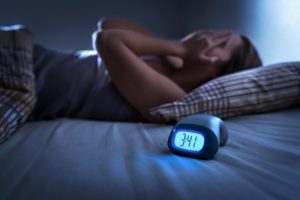What Insomnia Has to Do With the COVID-19 Pandemic
May 6, 2022

Two years ago, the world experienced the start of a global pandemic that affected every industry and every facet of our lives. The effects of the COVID-19 pandemic are still ongoing with many people altered by the stress and trauma of these events.
Have you experienced declining sleep health since the onset of the pandemic? In 2020, researchers began working to understand how this global event has altered the human psyche. Now, continuing research has revealed to us a concerning connection to sleep disorders, like insomnia.
A Pandemic’s Impact on Sleep
Dr. Rachel Manber, Professor of Psychiatry and Behavioral Sciences and Director of Stanford Sleep Health and Insomnia Program (SHIP), shared in a Stanford Medicine interview how the stress of the global pandemic has damaged the sleep health of many. While contracting the virus itself has been linked to rising cases of insomnia, the many worries associated with the COVID-19 pandemic itself have, and continue, to plague people’s sleep.
“The pandemic and related shelter in place measures to mitigate its spread have increase stress levels among many,” explained Manber, “People may worry not only about the disease itself, other health issue[s] that might not be optimally addressed, financial issue[s], as well as other psychological and interpersonal stressors. In general, worries and anxieties tend to have a negative impact on sleep.”
And certain groups are being harmed by this condition at greater rates than others. In April 2020, researchers re-interviewed participants from a 2016-2017 clinical trial on insomnia treatment. They found that for Black participants, insomnia was more greatly exacerbated from experiencing the pandemic than their white counterparts. This makes insomnia an issue of intersectionality, like most healthcare issues across the globe. After all, pandemic-provoked insomnia isn’t just an issue local to the United States. The insomnia rates in the UK jumped from one to six to one in four. During peak lockdown, insomnia rates in China rose from 14.6% to 20%. A May 2020 study showed that 40% of participants in Greece were experiencing insomnia.
How to Combat Pandemic-provoked Insomnia
Thanks to ongoing research conducted by Penn Medicine, there are several impactful ways identified to help you avoid forming pandemic-provoked insomnia and help those already suffering from insomnia to alleviate and manage their symptoms:
- Worrying is natural, but spiraling can have negative effects on your overall health. When you find yourself fixating on a particular worry, it’s important to first recognize this. Pinpoint where this worry is coming from and then redirect your attention to the present moment.
- Set a bedtime routine. Don’t let yourself get into bed too early in an attempt to make up for sleep lost the previous night. Try sitting on your couch and reading, or writing out a to-do list for the next day.
- Just as important as setting a bedtime routine, consistently getting up at the same time each morning is essential—even on the weekends.
- Can’t sleep? Avoid scrolling on your phone. Not only do screens send signals to your brain that you’re awake instead of relaxing for sleep, but you may see something upsetting either in the news or on your social media feed that triggers your anxiety.
- If lifestyle changes and sleep management aren’t helping, then consider consulting a professional. Many therapists are equipped with the skills to help you work through the mental challenges associated with your restless sleep.
Long COVID and Insomnia
At this point in the pandemic, many of us have heard of the term “long COVID.” Let’s dive into what that means, and how insomnia plays a role.
What is Long COVID?
The American Medical Association (AMA) explains that long COVID (also referred to as post-COVID conditions) “is a wide range of new, returning or ongoing health problems people may experience more than four weeks after being first infected with SARS-CoV-2.”
The association explains that there are three types of long COVID:
- Type 1: Direct cell damage from the virus that results in ongoing COVID-19 associated conditions.
- Type 2: Conditions that develop due to chronic hospitalization from contracting the virus.
- Type 3: Symptoms that develop after a person recovers from COVID-19 due to the makeup of their immune system and the inflammatory responses of their body.
Common symptoms of long COVID include:
- Shortness of breath, chest pain or tightness, and heart palpitations
- Tinnitus, earaches, joint pain, and rashes
- Dizziness, headaches, and brain fog
- Fatigue and insomnia
- Changes to sense of smell/taste
- Worsening or newly-developed depression and/or anxiety
- Nausea, diarrhea, stomach aches, loss of appetite
- Continuous high temperature, cough, sore throat
Insomnia and Long COVID
Insomnia post-covid is likely to fall into the first or third category, and what’s crystal clear is that cognitive dysfunction and/or “brain fog” are both well-documented impacts of the virus. In fact, it’s considered to be one of the most common long-term COVID-19 symptoms. Researchers suspect that this is due to the virus’ attack on an individual’s central nervous system, the immune system, and other essential bodily functions, such as regulating inflammation.
If you are one of the many COVID-19 survivors who is suffering from insomnia, the National Health Service (NHS) has developed a helpful guide on reclaiming rest after recovering from COVID-19.
If you’re a Dallas-Fort Worth community member dealing with long COVID or pandemic-induced insomnia, help is available. Sleep Dallas offers many treatment options for sleep disorders that range from insomnia to restless leg syndrome, to obstructive sleep apnea. Ready to start? Give us a call today at (844) 409-4657, or schedule an appointment online.
